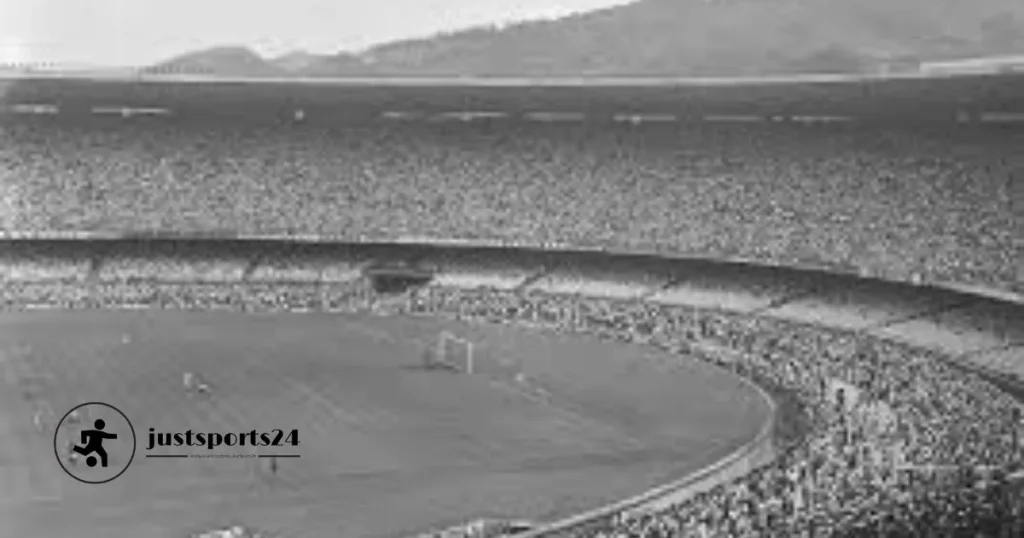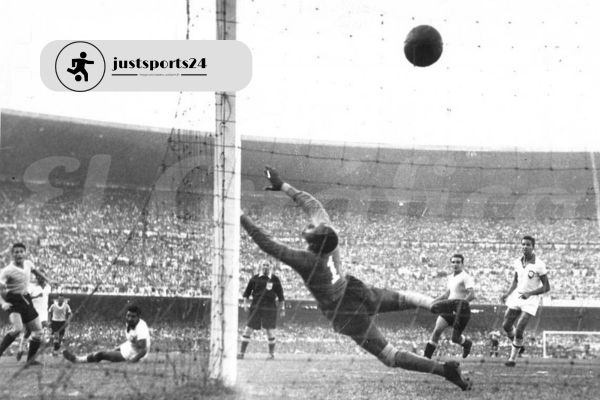
Hostilities broke out in 1939 and due to this fact, the tournament was wiped off for twelve years. The Fourth FIFA World Cup was primarily the first World Cup where, football, the greatest game on earth, returned after the war. But Brazil’s hosting of the men’s football Fourth FIFA World Cup was unique and still one of the most interesting tournaments in the history of this sport. Just like every FIFA World Cup, it also had its fascinating moments and achievements; throughout the tournament, even the most indifferent fans were fully absorbed adding to the history of football’s remarkable events. Now let’s go back to this remarkable tournament which made football officially welcomed in the world.
The Road to the 1950 World Cup
The last tournament before 1950 was held in 1938 in France and there is complete inactivity in international tournaments thereafter because of the scourge of the Second World War. FIFA’s decision-making in 1950 to stage the Cup again was a huge step in bringing the nations once again in sports. Brazil was the selected country to hold the tournament, a decision that was also influenced by its relative lack of damage during the war. For Brazil also, this was a time when it had to display its football zeal and prospects of being an upcoming footballing country.
The world was ready for proper international football where countries face each other in competition again. Nonetheless, issues such as team withdrawals and logistical problems were going to some extent to hinder the tournament considering the post-war hurdles. For instance, some big countries in Europe such as Germany and Japan were barred from competition as a result of their war activities while the Soviet Union did not enter the fray. Despite this, 13 countries were present and took competitions including four-time champions Italy for another title although still recovering from the war’s aftermath.
Tournament Structure and Teams

A completely new form of tournament was tested at the 1950 World Cup which has never been repeated anywhere since. Rather than a mass knockout format, which for the time was the case through this tournament, there was a round-robin group stage followed by a round-robin ‘final group’ for the championship. The change also triggered the need to devise strategies on how the World Cup would retain the audience’s concentration. The victory would be based on the number of points accrued in the final instead of winning a single elimination game.
The teams included in the tournament were categorized into four groups
Group 1:Brazil, Yugoslavia, Switzerland, Mexico
Group 2: Spain, England, Chile, USA
Group 3:Sweden, Italy, Paraguay
Group 4:Uruguay, Bolivia
Argentina was absent in the tournament as the team pulled out of the competition due to differences with FIFA while Scotland participated in the qualification rounds of the Fourth FIFA World Cupand even progressed out of the group qualification phase but did not play at the tournament. Moreover, the contest extended to include the first-ever participation of England in The Fourth FIFA World Cup. This was even though England had historically bjDayy constraints to all previous tournaments.
Brazil’s Control and the Epic ‘Maracanazo’
In the tournament hosted by Brazil, it was one of the most favored chances to win the competition. They were revered for their attacking, entertaining, and fun football, and their players were keen on bringing the trophy home to their lively fans. In the group stage, Brazil did not disappoint. To the amazement of all, the team kept marching on with jaw-dropping performances which included a 7-1 thumping of Sweden and a 6-1 demolition of Spain in the last group match.
The veneration does not end there, in fact, Brazil was charging towards what seemed to be the icing on the cake until the very last match of the last group which would later be dubbed as ‘the Maracanazo’ (Blow of Maracanã). All Brazil needed from the final match against Uruguay was a draw and then the trophy would be theirs. The Maracanã stadium was an open-air stadium that had a strong population of over 200,000 fans. Everyone presumed that all hopes were pinned onto Brazil to bring home the trophy and be crowned World Cup Champions.
However, what came next was one of the biggest surprises in being the less-favored team and overthrowing a champion: winning The Fourth FIFA World Cup. Brazilian fans were cheerful when the second half started. However, early thoughts were dismissed because Uruguay played better. It was Juan Alberto Schiaffino who equalized, then it was Alcides Ghiggia who scored the goal that wrapped up the match in the 79th minute. There was no cheer as Uruguay won the match and reclaimed the trophy for the second time by a score of two goals to one.
The Final Group Stage and Its Controversial Conclusion

Unlike The Fourth FIFA World Cups in which World Cups are held in the format of knockouts today, the final phase of the World Cup of 1950 was composed of a four-team group. The most points by a participant at the end of the matches of the final group of rounds is the King. It is this format that led to such a twist in the end, when in the last match for the trophy against the very Brazilian team, even though it wasn’t a classic final, Brazil ended up losing the title.
Uganda won the final group of the championship having registered two victories and one deadlock positions them as champions after a long-fought battle. 苦痛 The Maracanazo is one of the most memorable stories in football history thanks to Uruguay against early favorable odds and secondly sorrow Mexico.
Important Figures and Definitions
Even though Uruguay’s remarkable success is the highlight of The Fourth FIFA World Cup, there were other essential and unforgettable moments, as well as players, who proved to be quite a handful. In the final of the Japan Cup, Alcides Ghiggia who played for Uruguay scored the decided goal and became a legend of the country The Fourth FIFA World Cupenthusiasts turned into a cult.
Zizinho was also one of the most impressive players for Brazil who scored important goals in various parts of the tournament and entertained supporters with his talent. Zizinho often gets overshadowed by the maracanazo but a few people still remember Zizinho because of some of his best performances in world cups.
Apart from these already dominant footballing countries, the tournament indeed encompassed myriads of do not forget modern trends in ceramic decorations scores even the event the United States of America won beat England 1-0 in the group stages. Even this doubtful result can be included in the list of great upsets in The Fourth FIFA World Cup championships, which is one of the natures of the tournament.
The 1950 World Cup and Its Influences on Football and Society
The history of the Fourth World Cup is characterized by interesting forms and dramatic endings. The 1950 World Cup changed the course of international football in its context as the first culmination of fans after WWII.
The Maracanazo is a unique event in The Fourth FIFA World Cup History, that not only has been ingrained in the memories of the Uruguayans but also the Brazilians. The pain of the defeat deeply affected the scenario of Brazilian football, and it would take 8 more years before Brazil would win their first-ever World Cup in the year 1958.
In the case of Uruguay, the tournament marked the country’s emergence among the strong powers of the first decades of world football. The victory is still remembered and considered a matter of national pride and the team members are admired as heroes even today in Uruguay.
Conclusion
The World Cup of 1950 also known as the Fourth FIFA World Cup has remained over the years a tournament that has left all odds stacked against it, and after the fifth edition, has persisted in announcing what international football was going to become. Spanning from Brazil’s domination to Uruguay’s fairy tale, The Fourth FIFA World Cup never ceases to enthrall all the avid fans of football across the globe. Here at justsports24, we have the love of paying tribute to the past of the sport. Please note that as we move forward in bringing you the different tournaments, players, and even memorable moments in the beautiful game, some more insights and stories will be coming

